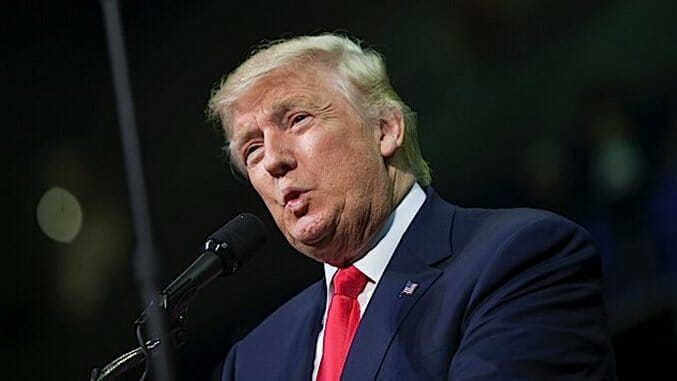Trump is America’s Franco: How Fascism Finds a Foothold in Democratic Nations
Photo by Jessica Kourkounis/Getty
The first time I heard someone compare Donald Trump to Adolf Hitler, I bristled.
Trump spent his campaign to win the RNC nomination vomiting hateful, ignorant rhetoric with such speed and consistency we didn’t have time process his latest moral blasphemy before he puked up another outrageous statement. Hitler incited the deadliest war and genocide in history: Sixty million buried, burned and bombed to pieces by one man’s madness. There’s no analogy between the two, I thought, and seeing a college kid who eked out a C in Poli-Sci 101 tweet a “Heil Trump” meme displayed deep ignorance.
Then, while living in Madrid earlier this year, Spaniards told me Trump reminded them of Francisco Franco — the fascist general who ruled the country for 36 years.
“Trump is like Franco,” a 30-something IT specialist told me at a bar. “He will be your Franco and so he will be the world’s Franco.”
He had a desperate force in his voice but I couldn’t tell how serious the guy was. We’d met an hour before, strangers paired up at a table for Madrileños looking to improve their English. I let the comment pass. Given enough time, every friend I made in the city would ask about Trump and I worked hard to answer honestly, then briskly moved past the subject. I honed a standard script that opened with an apology and closed by insisting he only appealed to sliver of Americans—a claim that became increasingly difficult to sell as he taunted, slandered and lied his way through debate victories and steamrolled into the RNC. I found myself failing to excuse our culture’s fascination with Trump while Spaniards repeatedly smacked me with the Trump-as-Franco metaphor.
At first, the comparison seemed as absurd as the “Heil Trump” nonsense — calling Trump a fascist seemed out-of-touch, almost funny. But I quickly learned these people don’t joke about Franco. El Generalissimo doesn’t pop up in Facebook memes or on bumper stickers. In the rare conversations when people mention the dictator, they usually do so in hushed tones fearful of calling forth the ghost that still haunts the nation.
Trump-as-Hitler quips reduce Hitler to an abstraction. Americans don’t have concentration camps converted into museums or grandparents who were tattooed and bulldozed into mass graves. We have an Internet axiom called Godwin’s Law of Nazi Analogies that proclaims, “As an online discussion grows longer, the probability of a comparison involving Nazis or Hitler approaches one.” For us, Hitler stands in as a stale, generic representation of ultimate evil. Spain doesn’t need a stand-in—they dealt with a very real ultimate evil.
During my first weeks there, I learned not to bring up Franco. Questions I asked about him went unanswered or were dismissed in a couple of sentences. There seems to be a tacit but systematic evasion of the man: If you try to look for his impact at Museo de Historia de Madrid, you’ll notice a glaring gap in the exhibitions between the years 1938 and 1975. Franco ruled with such cruel megalomania for nearly 40 decades most citizens chose to never mention him publicly — “We might use his name, most of us won’t, you should be careful not to,” my Spanish teacher said. In fact, the only time I heard about Franco was when he was compared to Trump.
But I couldn’t see it. I mean, look at them: One’s a mousy military man, the other is a Frankenstein’s monster cobbled together from the worst bits of Snooki, Scrooge McDuck and Biff from “Back to the Future.” Trump was a punchline, and cheap one at that. But this was before Trump became the official GOP candidate. As Trump buried his opponents under Tweets and bizarre-but-unchallenged claims, I took the comparison more seriously. I began to see it as the warning it was meant to be. Spaniards were scared: For us and for themselves.
Trump presents himself in a radically different manner than Franco. The Spanish caudillo was an introvert who avoid the spotlight. The Donald grins like a game show host loving every scrap of attention he can attract. But the pair share an obsessive xenophobia and shocking talent for using their political ineptitudes to stumble into success.
After meeting Franco, an American journalist said, “He did not give a frank answer to any question I put to him. A less straightforward man I never met.” Onetime ally and Spanish monarchist Juan Antonio Ansaldo wrote, “Franco is a man who says things and unsays them, who draws near and slips away, he vanishes and trickles away; always vague and never clear or categoric.”
Trump excels at this kind of deflection. Recall that early rally when someone asked him how we would get rid of American Muslims and he answered with, “We’re going to be looking at a lot of different things, and a lot of people are saying that, and a lot of people are saying that bad things are happening out there. We’re going to be looking at that and plenty of other things.” Or the rally months later when a different person also asked about how we can oppress American Muslims and he responded, “You know, and we are looking at that. And we are looking at that. We’re looking at a lot of things.”
-

-

-

-

-

-

-

-

-

-

-

-

-

-

-

-

-

-

-

-

-

-

-

-

-

-

-

-

-

-

-

-

-

-

-

-

-

-

-

-








































